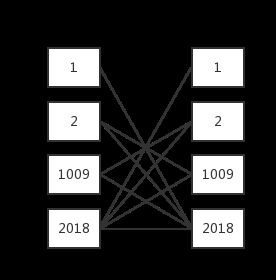HDU 6286 2018(容斥)
2018
Time Limit: 2000/1000 MS (Java/Others) Memory Limit: 32768/32768 K (Java/Others)
Total Submission(s): 229 Accepted Submission(s): 120
Problem Description
Given a,b,c,d, find out the number of pairs of integers (x,y) where a≤x≤b,c≤y≤d and x⋅y is a multiple of 2018.
Input
The input consists of several test cases and is terminated by end-of-file.
Each test case contains four integers a,b,c,d.
Output
For each test case, print an integer which denotes the result.
Constraint
- 1≤a≤b≤109,1≤c≤d≤109
- The number of tests cases does not exceed 104.
Sample Input
1 2 1 2018
1 2018 1 2018
1 1000000000 1 1000000000
Sample Output
3
6051
1485883320325200
题意
给你a,b,c,d 问你从 [a,b] [ a , b ] 和 [c,d] [ c , d ] 两个范围中取出两个数x和y相乘为2018倍数的个数
思路
首先分解一下2018这个数,2018一共有1,2,1009,2018四个因子,所以我们首先要找出 [a,b] [ a , b ] 中1,2,1009,2018,的因子数,因子这里就需要去重,因为你找含有1这个因子的数时,会把含有2的因子的含有1009的和2018的数都算上,所以含有1的因子数要去掉含有2,1009,2018的因子的个数,同样的找2这个因子数时也会就会把2018也算上,所以要去掉2018这个数,1009也是要去掉2018的
也就是
x[0]=b-a+1;
x[1]=b/2-(a-1)/2;
x[2]=b/1009-(a-1)/1009;
x[3]=b/2018-(a-1)/2018;
x[2]-=x[3];
x[1]-=x[3];
x[0]-=x[3]+x[2]+x[1];
注意顺序先把2和1009处理了再处理1的
两个区间都进行这样的操作后我们就有4*4里面的组合来凑出答案了

一共有9种组合我们把相应的数乘起来相加即可
#include